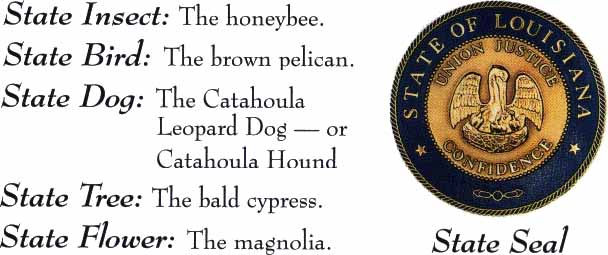 |
|||||||
The Louisiana History Page --People Of Louisiana
----Cajun Country Information----Music and the Sounds of Louisiana-- People of Louisiana
There is a rich diversity of peoples in Louisiana. They include the original Indian inhabitants, plus the descendants of a variety of settlers, among whom were the French, Spanish, English, German,
Acadians, West Indians, Africans, Irish and Italians and now include almost every nationality on earth. The original French colonists were soon joined by the Spanish and acadians, and later by French
aristocrats fleeing slave revolts in the West Indies or the horrors of the French Revolution. As part of Louisiana's French legacy counties are called "parishes" and the Napoleonic Code (rather than
Common Law) holds sway in the state's courtrooms. Ironically, it was the Spanish who built many of the colonial structures that still stand in the "French
Quarter" of New Orleans, and Spanish is still spoken in some communities, particularly in St. Bernard Parishbelow New Orleans. Hundreds of German families were recruited in 1719by the Company of
the West (which held the French royal charter for the development of Louisiana), and those sturdy pioneers settled upriver from New Orleans along a section of the Mississippi River that is still called
the Cote des Allemands ("German Coast"). The parishes north of Lake Pontchartrain (the sixth largest lake in the U.S.) and east of the Mississippi River were once a part of British West Florida,
occupied by English planters and military in the 1700s. Bernardo de Galvez, Louisiana's Spanish governor and an American ally in the Revolution, prevented the further development of a British
stronghold in the Mississippi Valley by capturing British forts at Manchac and Baton Rouge in 1779. Some years later, in 1810, citizens of the "Florida Parishes" staged the West Florida Rebellion against
Spanish authority in the region. They established the West Florida Republic, which enjoyed independence briefly before joining the American territory that had been acquired from France
through the Louisiana Purchase of 1803. Among the other nationalities that have settled in Louisiana are theYugoslavians who made a success
of oyster harvesting along the Gulf Coast and the Hungarians who became cultivators of strawberries and other crops in the Albany area. Free blacks amassed some of Louisiana's largest land holdings
prior to the Civil War and blacks have major contributions to Jazz and Louisiana cuisine in particular. And many of Louisiana's annual festivals are celebrations of particular ethnic contributions to the
"cultural gumbo" of this unique state. Cajun Country
The Canadian province of Acadia (today's Nova Scotia and surrounding regions) was settled in the early 1700s by French colonists, but the area became a British possession soon afterwards. In 1755,
as war neared between France and England, the British authorities demanded that the Acadians renounce their Roman Catholic faith and swear allegiance to the Crown. The Acadians refused and
the mass exile that followed is well known to all who have read Henry Wadsworth Longfellow's "Evangeline".
The migration of the French Acadians to Louisiana was neither smooth nor immediate. Many were shipped to the New England colonies, others to the West Indies or back to France, and many
wandered for 20 years before learning that they were welcome in the predominantly French territory of Louisiana. Here they established small farms along the Mississippi River, Bayou Teche, Bayou
Lafourche and other streams in the southern part of the region. Fishing and trapping villages were established in the swamplands. Cajun (the word is a corruption of the original French pronunciation
of Acadian--A-ca-jan) Country today lies within a triangle whose base is the Louisiana coast and whose apex is near Alexandria in the central part of the state. The triangle contains22 parishes and
the region's principal city, Lafayette, is the unofficial capital of "Acadiana". Cajun cooking may be a first cousin to the Creole cuisine of New Orleans, but there is none other
quite like it in the world for the imagination of its dishes or the artistic robustness of its seasoning. Favorite Cajun dishes include jambalaya, gumbo, turtle sauce piquante, andouille sausage, boudin (a
pork and rice sausage), cochon du lait, soft-shell crab, stuffed crab, a hundred shrimp dishes, crawfish etouffee, crawfish bisque, crawfish pie, and dozens more.
Cajun music can be lively or melancholy, ...and sometimes both at once. The traditional instruments are fiddle, accordion and triangle, and those still dominate (although drums and guitars have found
their way into Cajun bands in recent years). Like the spoken language of the Cajuns, the lyrics of their songs are part French, part English. The themes are universal, love (lost and found) and the
beauty of their land, but the melodies and phraseology are unique. Originally farmers, trappers and fishermen, today's Cajuns occupy virtually every occupation and are
the backbone of the state's oil and gas exploration and production industry, particularly offshore. When oil was first discovered in the North Sea more than 5,000 Cajuns with experience working on
oil rigs in the open sea were employed to drill the first wells and to provide training. Along with its food and music, the major trademarks of Cajun Country are pirogues (canoes made
from a single cypress log), Spanish moss, alligators, swamps, bayous and "Cajun Cabins". MUSIC HOT OFF THE BAYOU BY MICHAEL WALSH/LAFAYETTE I wanted to keep this article on my web page so I never lose it, because it really is a good article, but since the Author wants invoke attorneys about copyright infringement and is not concerned with getting information out about cajuns, please follow this link to the item. |
|||||||
Send comments or suggestions to: Marcus Fontenot All Pages Created By Atchafalaya Computer Consulting
The Displaced Cajun's Homepage ©Copyrighted 1995-99 by Marcus Fontenot |
|||||||
|








